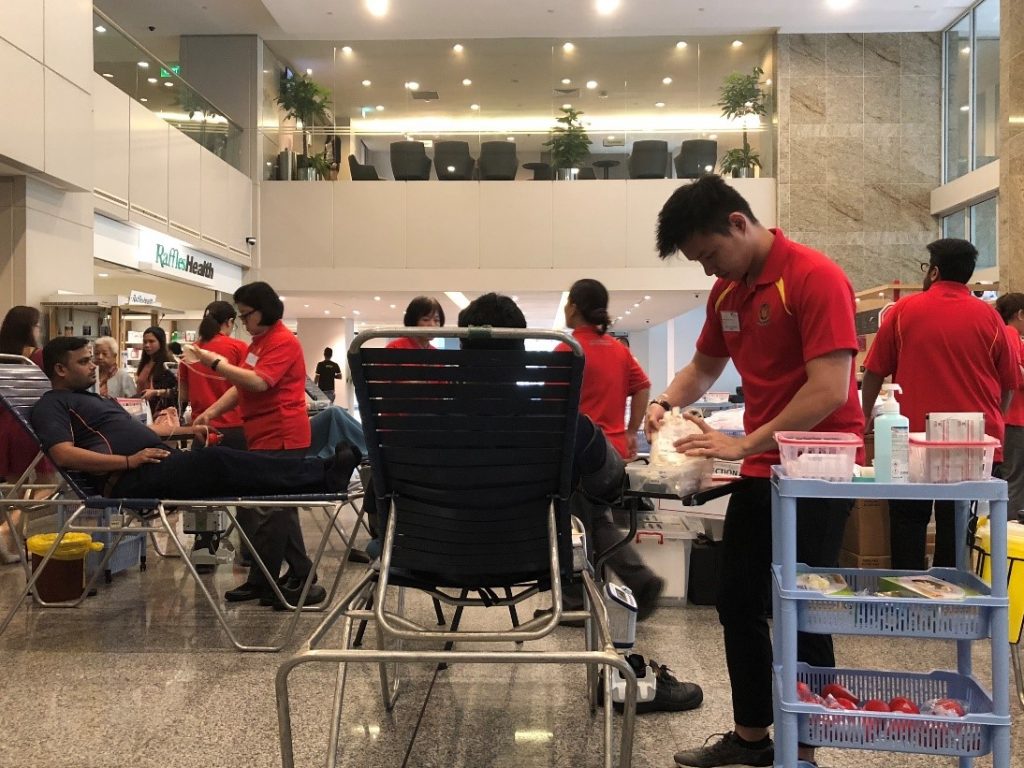One Day in the Life of a Blood Donor Manager
TAKE A SEAT: More donors started streaming in after lunch, at about 1-2pm. (PHOTO: Jewel Ng)
By Jewel Ng, Republic Polytechnic’s School of Management and Communication
To immerse myself in the life of a Blood Donor Manager, I followed Christabelle Ong, 25, a Blood Donor Manager at the Singapore Red Cross, at a blood donation drive at Raffles Hospital.
The mobile blood bank was due to start at 10 am, but the set-up was completed by 9.30am. At least ten staff were on-site to greet the first group of blood donors who arrived that morning.
As the Blood Donor Manager, Christabelle liaises with the Health Sciences Authority (HSA) and organisations. Typically, it takes about six months to plan a mobile blood donation drive. This includes scouting out a suitable location, and planning the publicity and internal communications.
“Why Don’t More People Donate?”
“Many people want to help others but are deterred by the pain,” said Christabelle. She added that blood donation is actually not that painful. Instead, it may help to sustain or save a life.
Often, people are concerned that blood donation is too time-consuming and they may have to pay. They fail to realise that, on the contrary, blood donation takes less than an hour during its peak period, and is free.
“To cater to everyone, we enhance convenience by going to different locations, and having blood drives in various community centres,” explained Christabelle.
That left an impression as I am guilty of using that excuse of “not having the time”.
Saving Lives
I then met Mdm Kim Toh Hee, a 64-year-old nurse of Raffles Hospital with 19 years’ experience in blood banks under her belt.
“I remember seeing patients fasting the whole day to prepare for their operations. Later, their operations were cancelled because there was not enough blood for their blood type. It was really disappointing for both parties. This is why we really encourage people to come forward and donate blood because you can save so many lives,” urged Mdm Kim who donated blood 37 times.
““Your red blood cells live for approximately 120 days in the circulatory system before being removed by the spleen. Instead of letting the cells be removed, you can give it to someone who needs it,” added Christabelle.
Peak Period
The crowd usually starts streaming in after lunch, filling up the seats and keeping the medical staff busy. I noticed that the blood donors generally looked comfortable and were not as nervous as I expected them to be.
One of the blood donors shared her motivation for donating blood.
“I had an operation 12 years ago because of a car accident. I was so close to not having a successful operation because there was not enough blood. It was a scary experience as I could have lost my life. Now, I make it a point to donate blood often because I know the importance of it,” said Michelle Chan, 39, an accountant.
Another donor, Muhd Shafiq, 31, shared, “It is my fifth time donating blood. The blood donation experience is quite fast and painless. It feels good knowing that I can potentially help others.”
Never Too Late to Donate
Christabelle encourages people to donate blood when they feel they are ready.
“Do eat beforehand, have a good sleep and hydrate yourself to have a better experience,” she advised.
After that day, I am definitely more aware of the impact of blood donations. I am ready to take the plunge, to donate blood for the first time in my life.
![]()


